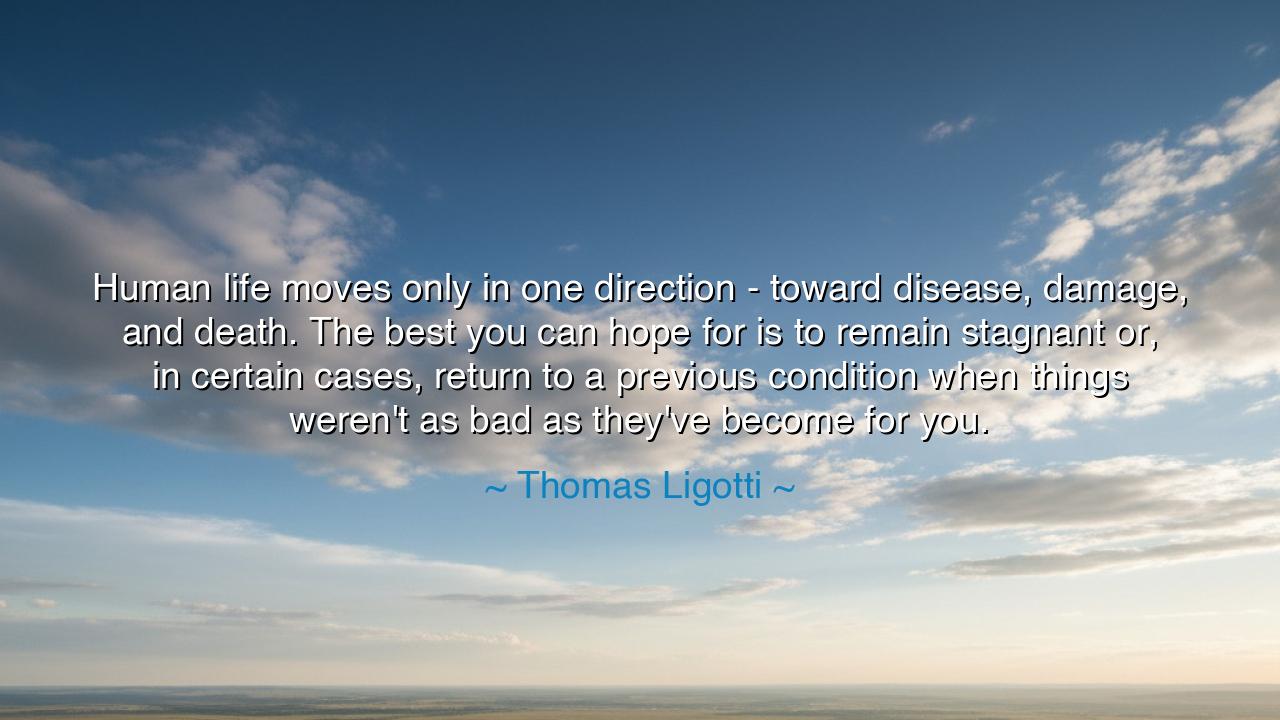
Human life moves only in one direction - toward disease, damage
Human life moves only in one direction - toward disease, damage, and death. The best you can hope for is to remain stagnant or, in certain cases, return to a previous condition when things weren't as bad as they've become for you.






“Human life moves only in one direction — toward disease, damage, and death. The best you can hope for is to remain stagnant or, in certain cases, return to a previous condition when things weren’t as bad as they’ve become for you.” — thus spoke Thomas Ligotti, the philosopher of the shadowed mind, whose words pierce through the comforting illusions that most mortals weave around themselves. In this grim and lucid statement, Ligotti strips away the veils of hope, progress, and purpose to expose what he believes is the true trajectory of existence — the slow, irreversible descent from vitality to decay, from creation to dissolution. His words are not born from despair alone, but from an almost mystical clarity, a gaze that dares to look upon life without the armor of delusion.
To the ancients, this understanding was not foreign. The philosopher Heraclitus spoke of flux — of all things flowing toward change and dissolution. The Buddha taught that life is dukkha, suffering, and that everything that arises must pass away. Yet, while these sages offered paths to transcend suffering through wisdom or detachment, Ligotti presents a darker revelation: that there is no true escape from the machinery of decay, that even the mind which perceives futility is bound by it. His is not the cry of a pessimist who wishes for better fortune, but the voice of one who sees entropy as the fundamental law of being — an unbroken current pulling every creature, every civilization, every star toward silence.
When Ligotti says that “the best you can hope for is to remain stagnant,” he reveals the cruel irony of human life: that our triumphs are fleeting pauses in decline. Youth resists time only for a season. Health, love, and joy bloom briefly before they wither. Even memory, the archive of the soul, fades as the years unfold. What we call recovery — from sickness, from heartbreak, from loss — is but a temporary return to lesser suffering, not renewal. To “return to a previous condition when things weren’t as bad” is to admit that every reprieve from pain is a fragile illusion, a brief plateau before the next descent. This is the essence of mortality: not the sudden blow of death, but the slow, unstoppable erosion of being.
And yet, though his words are steeped in darkness, there is a strange wisdom and mercy in Ligotti’s philosophy. For in confronting the inevitability of decay, he removes the burden of false hope — the endless striving for perfection, success, or immortality that chains the spirit to disappointment. When one accepts that suffering is the nature of existence, one can cease fighting the river and learn instead to flow with it, to move through pain with awareness rather than resistance. The Stoics of old would have nodded in agreement: to see life as struggle is not to surrender, but to awaken. For even if one cannot change the direction of life’s current, one can choose the manner in which one travels it — with fear, or with understanding.
History offers many who have faced this truth and found meaning within it. Consider the Roman emperor Marcus Aurelius, who, surrounded by plague, war, and betrayal, wrote calmly that “You could leave life right now. Let that determine what you do and say and think.” He did not deny decay or death; he accepted them as part of the cosmic order. In his acceptance, he found strength — the strength to rule justly, to live humbly, to love despite knowing all things perish. In this way, Marcus embodies the paradox that even within the inevitability of damage and death, there remains a space for dignity — a space where the human spirit, though doomed to fall, may still shine for a time before the dark.
Ligotti’s statement, then, may not be a curse upon life, but a kind of purification of perception. By extinguishing false dreams of eternal progress and denying the fantasy that we are exempt from decay, he invites us into lucid living — to see clearly the fragility of our days and thus to cherish them more honestly. For if all things decline, then every act of kindness, every moment of beauty, every breath of laughter becomes infinitely precious. Awareness of mortality does not diminish life; it distills it, stripping it of vanity and leaving only the essence — the pure experience of being, brief yet luminous.
Therefore, O seeker of truth, learn from these words not despair, but clarity. Know that life will move as it must: through disease, damage, and death. Do not flee this knowledge, but let it make you humble. Tend gently to your body while it still serves you; cherish your companions before they vanish into memory; labor not for permanence, but for presence. And when fear rises — as it will — remember that even in decay, even in decline, you are part of the great rhythm of the cosmos. The stars themselves burn out; the mountains crumble; yet the dance of existence continues. Accept this truth, and you will find not horror, but peace — the peace of one who no longer demands fairness from life, but walks with it, calmly, to its quiet and inevitable end.






AAdministratorAdministrator
Welcome, honored guests. Please leave a comment, we will respond soon